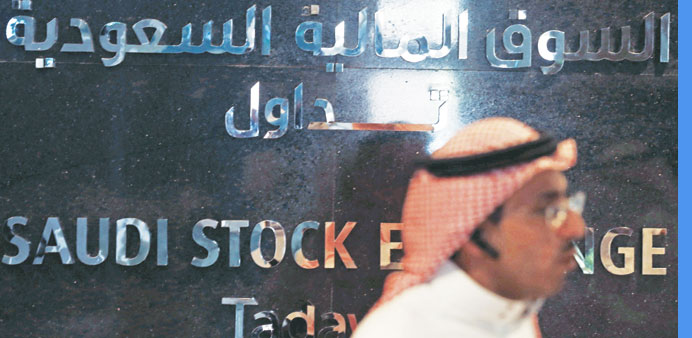A trader monitors screens displaying stock information (not in picture) at the Saudi Stock Exchange (Tadawul) in Riyadh. The main Saudi index sank 3.2% to 8,807 points yesterday, its biggest daily loss since late March, with nearly all stocks in the red.
Reuters/Dubai
Stock markets across the Middle East fell yesterday after oil prices dropped again and Saudi Arabia, heavily influenced by the petrochemicals sector, led losses, hitting a four-month low.
The main Saudi index sank 3.2% to 8,807 points, its biggest daily loss since late March, with nearly all stocks in the red. It has no significant technical support left above the April low of 8,502 points.
Petrochemicals giant Saudi Basic Industries tumbled 3.9%. The company’s profits have been hurt by the drop in oil prices over the last 12 months, and the commodity’s fresh weakness is a concern for investors.
US crude posted its biggest monthly drop - 21% - since the 2008 financial crisis on Friday after a string of losses in July triggered by China’s stock market slump and signs that top Middle East producers were pumping crude at record levels. Brent lost 5% on the week and 18% on the month.
Other companies in the petrochemicals industry also fell sharply, and the sector’s index was down 4.4%.
Red Sea Housing Services tumbled to its daily 10% limit after second-quarter profit dropped 58% on lower sales and margins and the firm announced delays in the implementation of some projects.
Mediterranean and Gulf Insurance & Reinsurance Co was also down 10% after swinging to a loss in the second quarter, which it blamed on higher claims.
In the latest monthly Reuters survey of leading Middle East fund managers, published on Thursday, 40% said they expected to cut equity allocations to Saudi Arabia in the next three months and just 7% to increase them. That compared with 27% intending to decrease allocations and 13% to increase them in the June survey.
With the exception of Turkey, Saudi Arabia was seen as the most negative major Middle Eastern equities market, because of high valuations and the heavy weighting of petrochemicals.
Another factor that may have hurt the sentiment of Saudi investors was a fresh restatement of earnings by telecommunications firm Mobily for the last 27 months; it slashed total profits over the period by nearly 1.76bn riyals ($470mn) in its latest attempt to resolve an accounting scandal. Shares in Mobily, which also posted a loss of 900.9mn riyals for the second quarter yesterday, have been suspended since June and will resume trading on Monday.
Dubai’s bourse fell 0.9% and property developer DAMAC was one of just a few gainers, jumping 2.6%. The company said yesterday its board would discuss second-quarter results and a dividend payout on Tuesday.
DAMAC’s board will also discuss the adoption of the IFRS 15 accounting standard, which allows developers to recognise off-plan sales earlier than under current practice.
Meanwhile another property-related firm, mortgage lender Amlak Finance, tumbled 8.5% and was the most traded stock in Dubai. Amlak had gained as much as 150% since it resumed trading in June after a multi-year suspension, and many fund managers and analysts saw the gains as highly speculative.
Egypt’s stock index inched up in early trade but then turned negative under the pressure of selling by Arab retail investors and closed 0.4% lower.
Commercial International Bank, the country’s biggest listed lender, fell 2.4% despite reporting second-quarter results last week that were in line with analysts’ forecasts.
But Ezz Steel rose 2.0% after Egyptian media reported that the state energy company had contracted to obtain a floating liquefied natural gas terminal that would supply the industrial sector. Ezz and other manufacturers have been suffering from severe energy shortages.
Elsewhere in the Gulf, Abu Dhabi’s index lost 0.9% to 4,791 points; Kuwait’s index slipped 0.3% to 6,237 points; Oman’s index inched down 0.04% to 6,555 points, while Bahrain’s index slipped 0.1% to 1,330 points.

